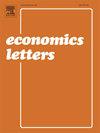“李约瑟之谜”与近代中国增长奇迹的新历史叙事:科举的视角
IF 1.8
4区 经济学
Q2 ECONOMICS
引用次数: 0
摘要
为什么中国不是工业革命的发源地,而是在过去40年里从帝王王朝崛起并经历了增长奇迹?我们发现,中国的科举制度(科举)在解释历史和现代/当代中国的兴衰中起着关键作用。我们发现,科举通过提高人力资本的同期水平、塑造创新和生产文化以及培育高效的制度,显著地促进了当代创新和商业创造。在历史时期,科举对科技领域的顶尖人才配置不当,导致明清时期科举发展缓慢。本文章由计算机程序翻译,如有差异,请以英文原文为准。
A new historical narrative for “Needham Puzzle” and the modern Chinese growth miracle: The perspective of keju
Why was China not the origin of the Industrial Revolution, but instead rose from imperial dynasties and experienced a growth miracle in the past four decades? We find that China’s imperial examination system (keju) plays a critical role in explaining the fall and rise of historical and modern/contemporary China. We find that keju significantly facilitates contemporary innovation and business creation by raising the contemporaneous level of human capital, shaping an innovative and productive culture, and fostering efficient institutions. In historical periods, keju misallocated top talents away from the scientific/technological sectors, leading to sluggish development during the Ming and Qing dynasties.
求助全文
通过发布文献求助,成功后即可免费获取论文全文。
去求助
来源期刊

Economics Letters
ECONOMICS-
CiteScore
3.20
自引率
5.00%
发文量
348
审稿时长
30 days
期刊介绍:
Many economists today are concerned by the proliferation of journals and the concomitant labyrinth of research to be conquered in order to reach the specific information they require. To combat this tendency, Economics Letters has been conceived and designed outside the realm of the traditional economics journal. As a Letters Journal, it consists of concise communications (letters) that provide a means of rapid and efficient dissemination of new results, models and methods in all fields of economic research.
 求助内容:
求助内容: 应助结果提醒方式:
应助结果提醒方式:


